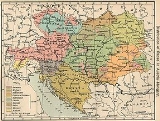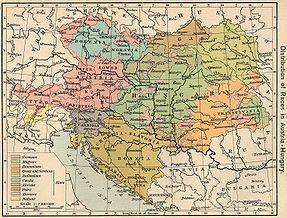
Austroslavism
Encyclopedia

Austrian Empire
The Austrian Empire was a modern era successor empire, which was centered on what is today's Austria and which officially lasted from 1804 to 1867. It was followed by the Empire of Austria-Hungary, whose proclamation was a diplomatic move that elevated Hungary's status within the Austrian Empire...
.
It was most influential among Czech
Czech people
Czechs, or Czech people are a western Slavic people of Central Europe, living predominantly in the Czech Republic. Small populations of Czechs also live in Slovakia, Austria, the United States, the United Kingdom, Chile, Argentina, Canada, Germany, Russia and other countries...
liberals
Liberalism
Liberalism is the belief in the importance of liberty and equal rights. Liberals espouse a wide array of views depending on their understanding of these principles, but generally, liberals support ideas such as constitutionalism, liberal democracy, free and fair elections, human rights,...
around the middle of the 19th century. First proposed by Karel Havlíček Borovský
Karel Havlícek Borovský
Karel Havlíček Borovský was a Czech writer, poet, critic, politician, journalist, and publisher. He lived and studied at the Gymnasium in Německý Brod , and his house on the main square is today the Havlíček Museum...
in 1846, as an opposition to the concept of pan-Slavism
Pan-Slavism
Pan-Slavism was a movement in the mid-19th century aimed at unity of all the Slavic peoples. The main focus was in the Balkans where the South Slavs had been ruled for centuries by other empires, Byzantine Empire, Austria-Hungary, the Ottoman Empire, and Venice...
, it was further developed into a complete political program by Czech politician František Palacký
František Palacký
František Palacký was a Czech historian and politician.-Biography:...
. Austroslavism also found some support in other Slavic nations in the Austrian Empire, especially the Slovenes and Croats
Croats
Croats are a South Slavic ethnic group mostly living in Croatia, Bosnia and Herzegovina and nearby countries. There are around 4 million Croats living inside Croatia and up to 4.5 million throughout the rest of the world. Responding to political, social and economic pressure, many Croats have...
.
The program
Austroslavism envisioned peaceful cooperation of the smaller Slavic nations of Central EuropeCentral Europe
Central Europe or alternatively Middle Europe is a region of the European continent lying between the variously defined areas of Eastern and Western Europe...
within the Habsburg Monarchy
Habsburg Monarchy
The Habsburg Monarchy covered the territories ruled by the junior Austrian branch of the House of Habsburg , and then by the successor House of Habsburg-Lorraine , between 1526 and 1867/1918. The Imperial capital was Vienna, except from 1583 to 1611, when it was moved to Prague...
not dominated by German
German language
German is a West Germanic language, related to and classified alongside English and Dutch. With an estimated 90 – 98 million native speakers, German is one of the world's major languages and is the most widely-spoken first language in the European Union....
-speaking elites. Palacký proposed a federation of 8 national regions, with significant self-governance. After the suppression of the Czech revolution in Prague
Prague
Prague is the capital and largest city of the Czech Republic. Situated in the north-west of the country on the Vltava river, the city is home to about 1.3 million people, while its metropolitan area is estimated to have a population of over 2.3 million...
in June 1848, the program became irrelevant. The Austrian Empire transformed into Austria-Hungary
Austria-Hungary
Austria-Hungary , more formally known as the Kingdoms and Lands Represented in the Imperial Council and the Lands of the Holy Hungarian Crown of Saint Stephen, was a constitutional monarchic union between the crowns of the Austrian Empire and the Kingdom of Hungary in...
(1867), honouring Hungarian
Hungary
Hungary , officially the Republic of Hungary , is a landlocked country in Central Europe. It is situated in the Carpathian Basin and is bordered by Slovakia to the north, Ukraine and Romania to the east, Serbia and Croatia to the south, Slovenia to the southwest and Austria to the west. The...
, but not Slavic demands as part of the Ausgleich
Ausgleich
The Austro-Hungarian Compromise of 1867 established the dual monarchy of Austria-Hungary. The Compromise re-established the sovereignty of the Kingdom of Hungary, separate from and no longer subject to the Austrian Empire...
. This further weakened the position of Austroslavism.
As a political concept, Austroslavism persisted until the fall of the Austrian-Hungarian Empire in 1918. It was exhibited in several proposals, lacking in influence, to federalise Austria-Hungary, for example that of Aurel Popovici
Aurel Popovici
Aurel C. Popovici was an ethnic Romanian Austro-Hungarian lawyer and politician of Serb origin...
(see United States of Greater Austria
United States of Greater Austria
The United States of Greater Austria was an idea created by a group of scholars surrounding the Austrian Archduke Franz Ferdinand that never came to pass...
).
Prominent supporters of Austroslavism
- Janez BleiweisJanez BleiweisJanez Bleiweis was a Slovene conservative politician, journalist and public figure. He was the leader of the so-called Old Slovene political movement. Already during his lifetime, he was called father of the nation....
- Karel Havlíček BorovskýKarel Havlícek BorovskýKarel Havlíček Borovský was a Czech writer, poet, critic, politician, journalist, and publisher. He lived and studied at the Gymnasium in Německý Brod , and his house on the main square is today the Havlíček Museum...
- Jernej KopitarJernej KopitarJernej Bartol Kopitar was a Slovene linguist and philologist working in Vienna. He also worked as the Imperial censor for Slovene literature in Vienna...
- Anton Tomaž LinhartAnton Tomaž LinhartAnton Tomaž Linhart was a Slovene playwright and historian, best known as the author of the first comedy in Slovene, Županova Micka...
- Fran Miklošič
- František PalackýFrantišek PalackýFrantišek Palacký was a Czech historian and politician.-Biography:...
- Paweł Stalmach
- Josip Juraj StrossmayerJosip Juraj StrossmayerJosip Juraj Strossmayer was a Croatian politician, Roman Catholic bishop and benefactor.-Early life and rise as a cleric:...
See also
- Pan-SlavismPan-SlavismPan-Slavism was a movement in the mid-19th century aimed at unity of all the Slavic peoples. The main focus was in the Balkans where the South Slavs had been ruled for centuries by other empires, Byzantine Empire, Austria-Hungary, the Ottoman Empire, and Venice...
- AustromarxismAustromarxismAustromarxism was a Marxist theoretical current, led by Victor Adler, Otto Bauer, Karl Renner and Max Adler, members of the Social Democratic Workers' Party of Austria during the late decades of the Austro-Hungarian Monarchy and the First Austrian Republic...
and national personal autonomyNational personal autonomyThe Austromarxist principle of national personal autonomy , developed by Otto Bauer in his 1907 book Die Nationalitätenfrage und die Sozialdemokratie was seen by him a way of gathering the geographically divided members of the same nation, "organize nations not in territorial bodies but in simple... - Olomouc University in the year of revolutions

